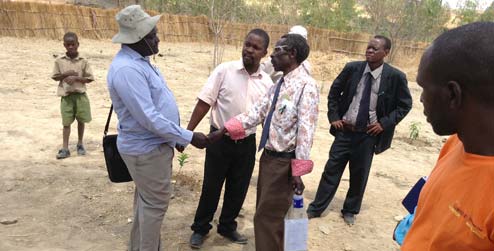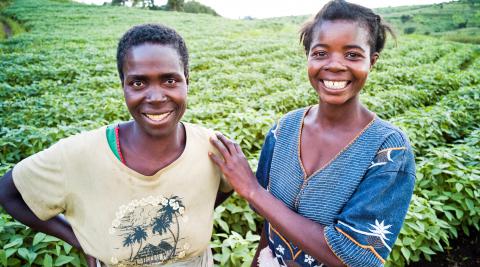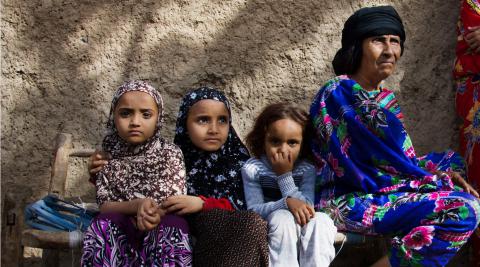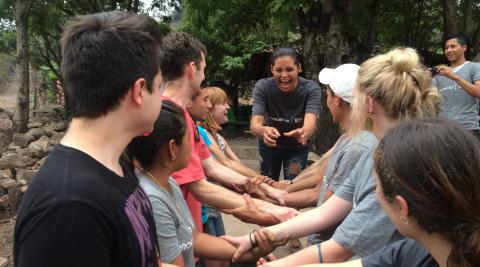Diego, from Zimbabwe, is currently working as an Agro-ecology, Product Development and Market Linkages Adviser, alongside Environment Africa Zimbabwe.
What is your work background?
I have been a rural development practitioner for more than 10 years. I have worked with people of diverse cultural and social backgrounds, at local and international level. Development work has enabled me to traverse the length and breadth of Africa, providing technical and professional capacity to development agencies and the less privileged of our global community. I have worked in countries like Liberia, Kenya, Namibia, Zambia and Malawi, to mention but a few.
What inspired you to become a development worker with Progressio?
I could not miss this new opportunity to transform the livelihoods of yet more people. Intrinsically, I am driven by the need to give more value to life, to create, grow and sustain a better livelihood option for people.
I have always liked working in the sustainable development thematic area, which concurs well with my skills, knowledge and passion. Progressio works at international level and therefore provides one with credible international exposure and the development worker model, though with some challenges, presents itself as an opportunity to develop local level capacities in the private and public sector.
What do you enjoy most about your role?
I am a passionate presenter and enjoy transferring skills and knowledge to partner staff and project beneficiaries, through various capacity building exercises. My work involves research and documentation and demonstrating programme impact, through the use of various approaches, to provide factual and empirical evidence of change. Being able to effect and demonstrate positive change on people’s livelihoods will always put a smile on my face.
What has been the most exciting moment so far?
I have been able to foster active participation in decision making by disadvantaged communities. This entails incorporating diverse thinking and ideas from Environment Africa staff and linking them with those of the community on one hand, and with Progressio’s strategic direction on the other.
Leading the process of writing a scientific paper with partner staff and presenting it at the EEASA (Environmental Education Association of Southern Africa) conference in Namibia, was an exciting and fulfilling experience as well. The paper remains a big success and was anchored on two main RICA (Progressio’s monitoring and evaluation framework) indicators covering food and income security benefits and forest benefits. It demonstrates changing attitudes of communities as a result of awareness-raising campaigns on environmental and natural resources management.
It principally seeks to provide evidence to two key project outcomes namely:
- Increase in household income and food security of poor and marginalised people in Zimbabwe through agro-ecology and sustainable, equitable farming approaches and access to market.
- More sustainable management of forest, land and water resources for the benefit of the most disadvantaged households in Zimbabwe.
And the biggest lesson?
The greatest ability that one can have is to be able to transfer abilities.
What is the biggest change you have witnessed since starting your placement?
Communities and Environment Africa staff are now more geared for market-orientated agricultural production, value addition and marketing than a year ago.
 Diego meeting with a local woodlot farmer, the District Administrator for the Guruve District and the headteacher of the local school
Diego meeting with a local woodlot farmer, the District Administrator for the Guruve District and the headteacher of the local school
What is the biggest development challenge facing Zimbabwe and/or the area in which you are working?
Despite the abundant and diversified natural resource base consisting of fertile arable land, biodiversity and water resources, Zimbabwe, with a largely agro-based economy, is highly vulnerable to the effects of climate change, which are exacerbated by poor economic development. This impacts negatively on access to better quality of life by our beneficiaries. Poor rainfall patterns, resulting in low agricultural production, coupled with limited access to water for irrigation, collectively affects productivity.
The political environment, which five years ago was not very favourable for development, has stabilised and now poses no significant threat to development.
If you could change one thing, what would that be?
The development worker model needs to ensure maximum utilisation of skills and knowledge among many partner organisations. It would be of benefit and less expensive if one development worker could be assigned to more than one partner. Working with one partner could be seen as the underutilisation of development worker potential.
What strikes you most about Progressio’s development worker model?
It serves as an easy conduit linking weaker organisations with stronger organisations in a partnership that benefits both.
What advice would you give to someone who is thinking of becoming a development worker?
Being a development worker simply goes beyond the ‘norm’. Counterparts may not always be grateful nor appreciate your presence. In fact it is how you present yourself to them that will make them see the value in you.
Development work is about commitment and the desire to transform lives. Never approach development work with preconceived ideas or solutions, but remain guided by the beneficiaries’ desires.
Where do you see yourself once your placement has ended? And in what ways is this placement with Progressio assisting you to get there?
I see myself providing leadership to other NGOs and other members of civil society.
The placement is exposing me to global level good practices acceptable by universal standards, for example the SPHERE standards, the Do-No Harm approach, Sustainable Development Goals, and others. I am also able to attend and participate in a number of platforms and networks, at national and international level.






